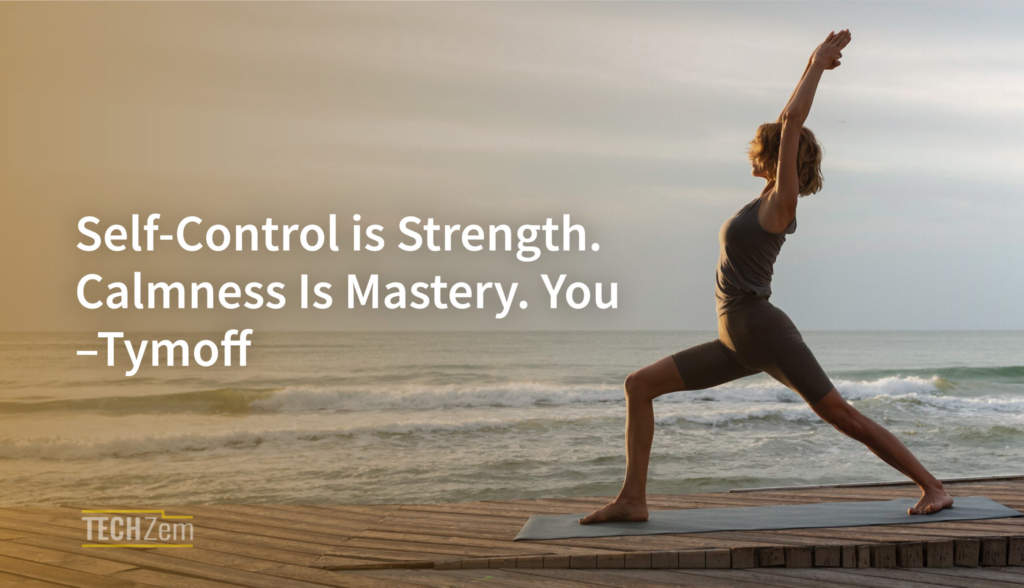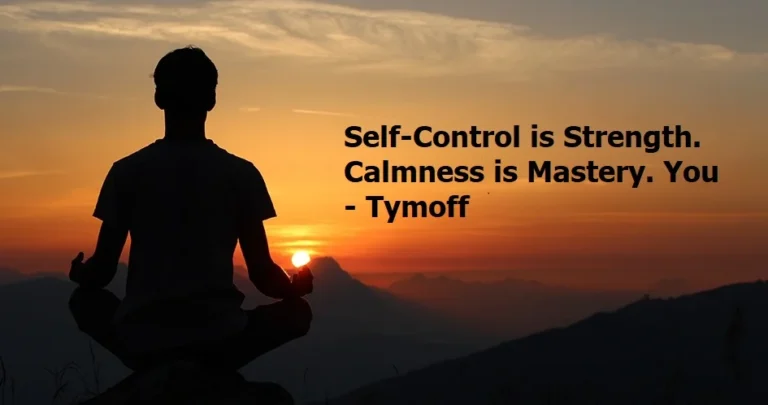The ability to maintain self-control and remain calm can be the difference between success and failure. The quote “Self-control is strength. Calmness is mastery. You – Tymoff” resonates deeply with those who strive for personal growth and inner peace. This article explores the profound wisdom behind these words, dissecting the concepts of self-control and calmness and providing practical tips on how to incorporate them into daily life.
Understanding Self-Control
Self-control, at its core, is the ability to regulate one’s emotions, thoughts, and behaviours in the face of temptations and impulses. It is the power to pause, think, and act in ways that align with long-term goals rather than short-term desires. This strength is not only about resisting negative behaviours but also about pursuing positive ones with consistency and discipline.
Importance of Self-Control in Personal Growth
Self-control is the cornerstone of personal development. Without it, goals become unattainable, and desires lead to distractions. It is the silent force that drives us to stay focused, make rational decisions, and avoid self-sabotaging behaviours. Whether it’s sticking to a diet, saving money, or simply resisting the urge to respond impulsively in a heated moment, self-control is the foundation of progress.
Examples of Self-Control in Daily Life
Consider the simple act of choosing a healthy meal over fast food. This decision, while seemingly small, is a powerful example of self-control. It reflects a choice that prioritizes long-term health over immediate satisfaction. Another example is the discipline to wake up early to exercise, even when the comfort of sleep is tempting. These daily acts of self-control compound over time, leading to significant positive changes in one’s life.
The Power of Calmness
Calmness is the state of being tranquil and composed, regardless of external circumstances. It is the ability to maintain a steady mind, even when surrounded by turmoil. Being calm doesn’t mean being emotionless; rather, it means managing emotions in a way that doesn’t allow them to dictate your actions.
The Role of Calmness in Decision-Making
A calm mind is a powerful tool in decision-making. When calm, one can think more clearly, weigh options more carefully, and make decisions that are aligned with their values and goals. In contrast, a mind clouded by stress or anger is prone to making rash decisions that often lead to regret.
Calmness is beneficial for personal well-being and plays a crucial role in maintaining healthy relationships. A calm demeanor fosters open communication, reduces conflicts, and helps resolve disagreements amicably. When you approach situations with calmness, you create a space where others feel heard and respected, leading to stronger, more meaningful connections.
The Interplay Between Self-Control and Calmness
Self-control and calmness are deeply interconnected. When you exercise self-control, you are better equipped to remain calm in stressful situations. For instance, if you have the self-control to not react immediately in an argument, you give yourself the opportunity to calm down and respond thoughtfully rather than impulsively.

The Symbiotic Relationship Between Calmness and Self-Control
Just as self-control fosters calmness, calmness also reinforces self-control. When you are calm, you are less likely to be swayed by emotions and more likely to make decisions that reflect your true intentions. This symbiotic relationship creates a cycle of positive reinforcement, where each quality strengthens the other.
Case Studies and Real-Life Examples
One example of this interplay can be seen in professional athletes. Athletes often face high-pressure situations where the outcome hinges on their ability to stay calm and controlled. Those who master these qualities not only perform better but also recover more quickly from setbacks, illustrating the power of self-control and calmness in action.
Practical Ways to Develop Self-Control
Mindfulness and Meditation
Mindfulness and meditation are powerful tools for developing self-control. You train your mind to stay present, which helps in reducing impulsive reactions. Meditation, on the other hand, strengthens your ability to focus and maintain discipline over your thoughts and actions.
Setting and Maintaining Boundaries
Setting clear boundaries is another essential aspect of self-control. By establishing what you will and will not tolerate, you create a framework that helps you stay aligned with your values and goals. This can be as simple as deciding not to check your phone during meals or as significant as setting limits on how much time you spend with certain people.
Self-Discipline Exercises
Self-discipline exercises, such as committing to a daily routine, setting short-term goals, or practicing delayed gratification, can significantly enhance your self-control. These exercises train your mind and body to follow through with commitments, even when it’s challenging.
Cultivating Calmness in Everyday Life
Breathing techniques are one of the most effective ways to cultivate calmness. Simple practices, such as deep breathing or the 4-7-8 technique (inhale for 4 seconds, hold for 7, exhale for 8), can quickly calm your mind and body.
Rest and sleep are crucial for maintaining calmness. A well-rested mind is less prone to stress and more capable of handling daily challenges with grace. Ensuring you get enough sleep and taking breaks when needed are key to staying calm and composed.
Handling stressful situations calmly often requires a proactive approach. This can include planning ahead, practicing positive self-talk, or even temporarily stepping away from a situation to regain composure. The key is to have strategies in place that you can rely on when stress levels rise.
The Impact of Self-Control and Calmness on Success
Self-control and calmness are invaluable assets. They enable you to stay focused on your career goals, navigate office politics gracefully, and make decisions that advance your career rather than hinder it. Employers often look for individuals who can maintain composure under pressure, as these are the people who can lead effectively.

Self-control and calmness greatly contribute to personal well-being. They reduce stress, improve mental health, and lead to a more balanced life. When you have control over your actions and can maintain calmness, you are better equipped to handle life’s ups and downs with resilience.
Great leaders are often characterized by their ability to remain calm in the face of adversity and to lead with self-control. These qualities inspire confidence in others and create an environment where rational decisions are made. Leaders who embody these traits are not only respected but also leave a lasting positive impact on their teams and organizations.
Conclusion
Self-control and calmness are not just admirable traits; they are essential for a fulfilling and successful life. By mastering self-control, you gain the strength to stay focused on your goals, and by cultivating calmness, you gain the mastery to navigate life’s challenges with grace. Together, these qualities form a powerful duo that can transform your life. As you continue on your journey, remember that the path to self-control and calmness is a continuous one, requiring patience, practice, and persistence.
People Also Ask
How can I improve my self-control?
Improving self-control starts with small, consistent actions. Effective strategies include practicing mindfulness, setting clear goals, and avoiding temptations. Over time, these habits strengthen one’s ability to control impulses and stay focused on what truly matters.
What are some simple ways to stay calm under pressure?
Staying calm under pressure can be achieved through breathing exercises, taking short breaks to clear your mind, and practising positive self-talk. Preparing for potential stressors in advance can also help you maintain composure when challenges arise.
How does self-control contribute to success?
Self-control is crucial for success because it enables you to stay committed to your long-term goals, resist distractions, and make decisions that align with your values. It helps you remain disciplined and focused, even when faced with challenges.
Can anyone master calmness?
Yes, anyone can master calmness with practice. Techniques like mindfulness, meditation, and deep breathing can help you cultivate a calm mindset. Over time, these practices become second nature, allowing you to remain calm in various situations.
Why is calmness considered a form of strength?
Calmness is considered a form of strength because it reflects control over one’s emotions. It allows one to respond to situations thoughtfully rather than react impulsively, which is essential in making rational decisions and maintaining healthy relationships.

